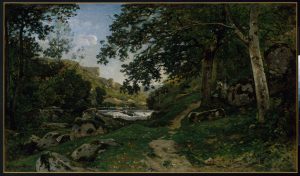An Illicit Affair of Adolescence – The Lover
“Everything flows towards the Pacific, no time for anything to sink, all is swept along by the deep and head-long storm of the inner current, suspended on the surface of the river’s strength” (Duras 22)
To fully understand what is happening in this novel, one must observe the disturbing content embedded.
The Lover is a story about an illicit affair between a young girl and an older man who just so happens to be Chinese. While on paper, many readers can assume that this entanglement is the worst of the novel. The young girl’s mother is incredibly abusive as well as her older brother is extremely violent and filled with rage.
With that out of the way, The Lover is a good book. I am not justifying these actions, but they serve as somewhat of an autobiographical retelling of this hidden love. The two titular lovers have not just age but race against them. This is what portrays such a complex narrative. The lovers are sharing an interracial relationship, thereby fighting against the prejudices stacked against them. When meeting for the first time at a dinner, there is an underlying tension as her “brother gorge themselves without saying a word to him” (Duras 51). While it is not said the two are in a relationship, the white brothers are still hesitant to this ‘outsider’. The book’s themes are so nuanced that readers can find themselves connecting with taboo characters like the older lover. He is an example of the wealth of narratives in this novel–Duras is so precise to flesh out everyone’s stories, because this is her authentic life.
Hence, the novel begins as Marguerite’s leap into a sexual awakening. It is another coming-of-age story except with a focus on love and desire. In the end, her and her lover don’t end up together–the latter’s father forbidding the son from marrying a white girl. It becomes a fleeting memory that has ached in Duras’s chest for a long time.
Between her sexual revelation, Duras becomes aged to the world–not in the sense of no longer being a virgin but in finally witnessing the true world. She is not afraid to release her true experiences, no matter how risqué. This novel serves as a woman trying to recollect her life–the sudden jumps between times indicate an authentic portrayal of memory.
My review comes up short because the book was so…complex.
Good books can have you writing long passages, carefully analyzing every detail, or it can have you sitting on the floor, trying to understand the emotional turmoil the book carried you along for.
I would say this book broke me, but that is a very dramatic statement.
“I see the war as I see my childhood. I see wartime in the reign of my elder brother as one. Partly, no doubt, because it was during the war that my younger brother died: his heart, as I’ve said, had given out, given up. As for my elder brother, I don’t think I ever saw him during the war. By that time it didn’t matter to me whether he was alive or dead. I see the war as like him, spreading everywhere, breaking in everywhere, stealing, imprisoning, always there, merged and mingled with everything, present in the body, in the mind, awake and asleep, all the time, a prey to the intoxicating passion of occupying that delightful territory, a child’s body, the body of those less strong, of conquered peoples. Because evil is there, at the gates, against the skin” (Duras 62-63)
Discussion Question
By titling the book The Lover, what is Duras really trying to convey? (Hint, it’s not about love)
How is the archetype of a “Lover” used to redefine Duras’s experiences? Can we argue that she is acting in opposition to this role? Or is she perhaps commenting on those loves that are not romantic per say?
Bonus
This book is severely uncomfortable in its themes, so please enjoy my message to society (the following is a joke)
Why must we, as a distinguished society, cast a shadow on fedoras? I prominently wore fedoras as a child and looked adorable. Case in point, here is proof from my father’s facebook – Gabby




